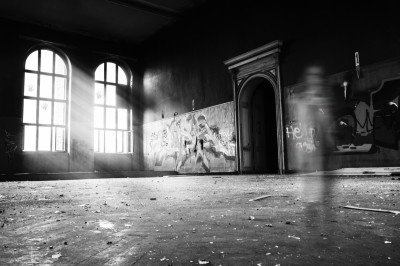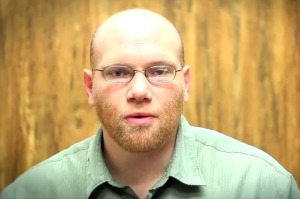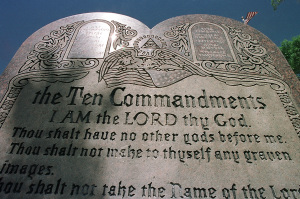Ghosts, Ouija boards, and the line you don’t cross

If you’ve never watched one of the 320,000 different ghost hunter-type shows on cable, I can save you the trouble by quickly describing every episode that’s ever been recorded. First, they’re all shot in the dark, so you’re watching everything occur through green night vision.
At some point during the show, the following conversation between the ghost hunters will take place:
Bob the ghost hunter: “Zak, I just felt a cold spot!”
Zak the other ghost hunter: “No way Bob…where?”
Bob the ghost hunter: “Over here by the door.”
A cold draft? Over by a door? Hold the phone, that never happens so it must be supernatural. And wait, Bob, what’s that glow coming from your flashlight?
These shows have the same thing in common with all the Bigfoot programs, which provide everything you want to see except one thing: an actual Bigfoot. Even though today we have drones, motion-sensitive trail cameras, thermal imaging technology that can spot a caterpillar crawling on a mountainside, and countless hikers with cell phone cameras that capture images ½ mile away – Bigfoot, by all measures, remains the hide-and-seek world champion.
If you believe in ghosts, I hate to burst your bubble, but they don’t exist. And by ghost, I’m using the traditional definition of a person who has died and is manifesting themselves in some way to the living, their spirit being trapped between this life and the next.
No, there are no such things as ghosts. But there is something much worse that is real.
The real thing
In 2015, the cable channel Lifetime released a series, called I was Possessed, that chronicled cases of reported demonic possession. When I saw it, I assumed it was going to be along the same lines like all the other ghost hunter shows. Turns out, it surprised me.
I’m not going to tell you that I believe every case they documented was legitimate.[1] But what I can say is that, given the small amount of experience I’ve had in this area, a number of the cases followed the same pattern I’ve encountered.
A person with no history of mental instability moves into a residence where some form of occultic activity was habitually performed or they naively begin to dabble in the occult themselves through Ouija boards, seances, or similar activities. Most times, nothing immediately happens.
But then things start to change. What seems like an all-encompassing irrational fear descends on them. An oppressive heaviness starts to weigh them down. Physical disturbances sometimes start to occur. Out-of-character thoughts begin to intrude into their mind, which leads to compulsive urges to carry them out. A dislike for Christian artifacts may develop.
The person is plagued by fear, anguish, guilt, and helplessness not knowing what is happening or who to turn to for help. Some become crippled from a normal life standpoint until they find their way to an experienced Christian who can work with them to bring about deliverance.
The New Testament uses the Greek term daimonizomai to describe a person troubled by demons, and we see Jesus and His disciples overcoming their affliction in the Gospels numerous times. There’s nothing in Scripture I see that indicates demonic oppression and possession can’t occur today; in fact, there are a number of news stories stating they are on the rise.
A hotly debated question
Merrill Unger, a noted theologian and professor at Dallas Theological Seminary, wrote a book entitled Biblical Demonology. In it, he argued the case that a Christian cannot be demonically possessed or oppressed.
Shortly thereafter, Dr. Unger began receiving letters from missionaries, pastors, and other Christians detailing their accounts with born-again believers who experienced demonization. Dr. Unger did something that is very rare today – he thoroughly investigated an opinion contrary to his published belief.
After researching what had been sent to him and other cases, Unger ended up writing another book, What Demons can do to Saints, where he changed his opinion to one where he stated Christians can be demonized given certain conditions.
This is a strongly debated issue with some aghast at the thought that a demon can trouble a believer, while others, like Chuck Swindoll, in his little book entitled Demonism, state: “For a number of years I questioned this, but I am now convinced it can occur…I have personally worked with troubled, anguished Christians for many years. On a few occasions, I have assisted in the painful process of relieving them of demons.”
My opinion is that there are enough warnings in Scripture aimed at Christians about the devil to make me believe we aren’t immune to enemy attacks.
The analogy I use to warn believers of demonic assault is that of a dangerous dog, which lives within the boundaries of an electric/invisible fence. If you stay outside the dog’s domain, he can’t get to you. But cross that border into his sphere, then it’s game on, and the primary blame for whatever happens falls on you.
Real spiritual warfare is the exact opposite of the ghost hunter shows on the cable networks that attract many (hopefully not you). Ghosts aren’t real; the enemy and his army are. Do yourself a favor and don’t cross the line – via repetitive sin or occult interest – into his territory, give him a foothold (Eph. 4:27), and make yourself a meal for him.
[1] An enormous amount of mental illness exists in society, especially today, and some confuse mental instability with a spiritual problem like demonization. This is why most Christians who assist such people insist that they first seek help from a medical professional.
Robin Schumacher is an accomplished software executive and Christian apologist who has written many articles, authored and contributed to several Christian books, appeared on nationally syndicated radio programs, and presented at apologetic events. He holds a BS in Business, Master's in Christian apologetics and a Ph.D. in New Testament. His latest book is, A Confident Faith: Winning people to Christ with the apologetics of the Apostle Paul.




























